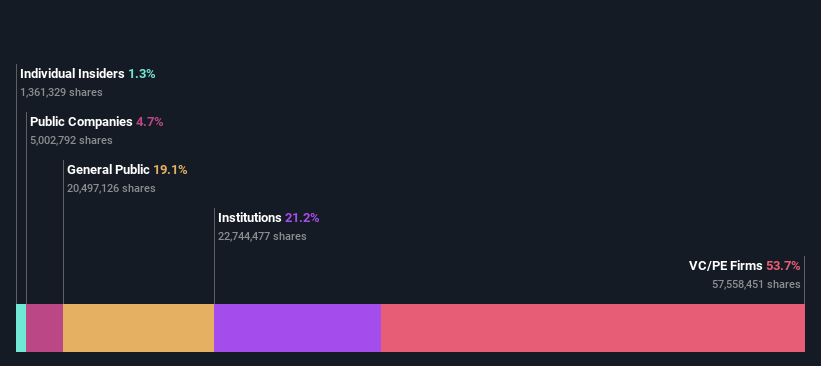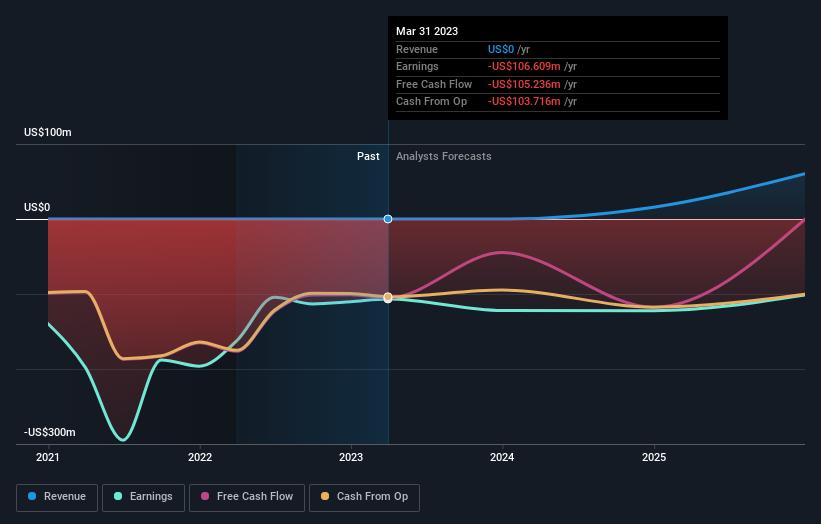Institutions own 21% of LianBio (NASDAQ:LIAN) shares but private equity firms control 54% of the company
Key Insights
Significant control over LianBio by private equity firms implies that the general public has more power to influence management and governance-related decisions
The largest shareholder of the company is Perceptive Advisors LLC with a 54% stake
If you want to know who really controls LianBio (NASDAQ:LIAN), then you'll have to look at the makeup of its share registry. We can see that private equity firms own the lion's share in the company with 54% ownership. Put another way, the group faces the maximum upside potential (or downside risk).
And institutions on the other hand have a 21% ownership in the company. Generally speaking, as a company grows, institutions will increase their ownership. Conversely, insiders often decrease their ownership over time.
Let's take a closer look to see what the different types of shareholders can tell us about LianBio.
See our latest analysis for LianBio
What Does The Institutional Ownership Tell Us About LianBio?
Many institutions measure their performance against an index that approximates the local market. So they usually pay more attention to companies that are included in major indices.
We can see that LianBio does have institutional investors; and they hold a good portion of the company's stock. This implies the analysts working for those institutions have looked at the stock and they like it. But just like anyone else, they could be wrong. If multiple institutions change their view on a stock at the same time, you could see the share price drop fast. It's therefore worth looking at LianBio's earnings history below. Of course, the future is what really matters.
We note that hedge funds don't have a meaningful investment in LianBio. Perceptive Advisors LLC is currently the company's largest shareholder with 54% of shares outstanding. With such a huge stake in the ownership, we infer that they have significant control of the future of the company. With 4.7% and 4.0% of the shares outstanding respectively, BridgeBio Pharma, Inc. and Cormorant Asset Management, LP are the second and third largest shareholders.
Researching institutional ownership is a good way to gauge and filter a stock's expected performance. The same can be achieved by studying analyst sentiments. Quite a few analysts cover the stock, so you could look into forecast growth quite easily.
Insider Ownership Of LianBio
The definition of company insiders can be subjective and does vary between jurisdictions. Our data reflects individual insiders, capturing board members at the very least. Management ultimately answers to the board. However, it is not uncommon for managers to be executive board members, especially if they are a founder or the CEO.
Insider ownership is positive when it signals leadership are thinking like the true owners of the company. However, high insider ownership can also give immense power to a small group within the company. This can be negative in some circumstances.
We can see that insiders own shares in LianBio. In their own names, insiders own US$2.7m worth of stock in the US$215m company. This shows at least some alignment. You can click here to see if those insiders have been buying or selling.
General Public Ownership
With a 19% ownership, the general public, mostly comprising of individual investors, have some degree of sway over LianBio. While this size of ownership may not be enough to sway a policy decision in their favour, they can still make a collective impact on company policies.
Private Equity Ownership
With an ownership of 54%, private equity firms are in a position to play a role in shaping corporate strategy with a focus on value creation. Some might like this, because private equity are sometimes activists who hold management accountable. But other times, private equity is selling out, having taking the company public.
Public Company Ownership
It appears to us that public companies own 4.7% of LianBio. We can't be certain but it is quite possible this is a strategic stake. The businesses may be similar, or work together.
Next Steps:
While it is well worth considering the different groups that own a company, there are other factors that are even more important. Like risks, for instance. Every company has them, and we've spotted 2 warning signs for LianBio (of which 1 is potentially serious!) you should know about.
If you would prefer discover what analysts are predicting in terms of future growth, do not miss this free report on analyst forecasts.
NB: Figures in this article are calculated using data from the last twelve months, which refer to the 12-month period ending on the last date of the month the financial statement is dated. This may not be consistent with full year annual report figures.
Have feedback on this article? Concerned about the content? Get in touch with us directly. Alternatively, email editorial-team (at) simplywallst.com.
This article by Simply Wall St is general in nature. We provide commentary based on historical data and analyst forecasts only using an unbiased methodology and our articles are not intended to be financial advice. It does not constitute a recommendation to buy or sell any stock, and does not take account of your objectives, or your financial situation. We aim to bring you long-term focused analysis driven by fundamental data. Note that our analysis may not factor in the latest price-sensitive company announcements or qualitative material. Simply Wall St has no position in any stocks mentioned.
Join A Paid User Research Session
You’ll receive a US$30 Amazon Gift card for 1 hour of your time while helping us build better investing tools for the individual investors like yourself. Sign up here


